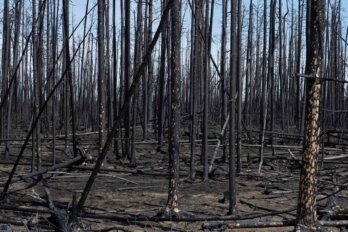
In 1988, 300 scientists and policy-makers met at a conference in Toronto to address “The Changing Atmosphere: Implications for Global Security.” They concluded that pollutants resulting from human activity were altering the earth’s atmosphere, and they predicted severe economic and social dislocations that would increase the risk of conflicts among and within nations. “Humanity is conducting an unintended, uncontrolled, globally pervasive experiment,” they warned, “whose ultimate consequences could be second only to a global nuclear war” (italics mine).
This was twenty-five years ago, before evidence gathered from all of the continents and most of the oceans confirmed that climate change, particularly rising temperatures, is affecting many natural systems. Some fluctuations are inevitable, regardless of human activity; but, according to the Intergovernmental Panel on Climate Change, centuries of global warming lie ahead if we continue to burn fossil fuels and raze forests with abandon. In 1988, that assertion might have seemed speculative, but no more: we have only to look around to witness the glaciers retreating, the ice caps melting, the deserts growing, the coral reefs dying. I recently visited Beijing, where this past January the air quality index soared beyond 750. Anything above 100 is considered unhealthy for sensitive individuals; anything above 300 is hazardous for everyone else. In Beijing, wearing masks outdoors has become commonplace—and the air there is far from the world’s worst.
At the 1992 Earth Summit in Rio de Janeiro, the nations of the world pledged to reduce greenhouse gases but couldn’t agree on how much global warming was too much. And so it went at conferences in Kyoto, Japan (1997); Cancún, Mexico (2010); Durban, South Africa (2011); and Doha, Qatar (2012)—the problem readily acknowledged, but a realistic, mutually acceptable plan to deal with it elusive. The United States signed the Kyoto Protocol, but the Senate withheld ratification because the agreement made less stringent demands on the developing world, a position the Canadian government supported. For their part, developing nations remain reluctant to accept mandatory emission reductions, arguing that the richest countries are still the biggest polluters. Kicking the can down the road, delegates at Doha extended the Kyoto accord until 2020 (it was due to expire in 2012), and committed to more ambitious but as yet unspecified actions in the years to come. Mañana.
We have entered a period of human history in which the problems we face—and climate change is but one—are so massive and complex that no country, no matter how powerful, can solve them alone. Yet we continue to allow our attachment to sovereignty to get in the way of meaningful collective action. The dictionary defines sovereignty as freedom from external control, which is seen as desirable. People die for it. The question going forward, however, is whether people will die because of it.
International co-operation is by no means a novel concept; philosophers and statesmen have pondered it for centuries. In 1814, the French socialist Claude Henri de Rouvroy wrote an essay that anticipated the European Union, although (not foreseeing the likes of Margaret Thatcher) he wrongly assumed England would take the lead. In response to the horror of World War I, the great powers launched the League of Nations, which failed because in the end they couldn’t agree on how to enforce the disarmament of Germany, Italy, and Japan. While longer lived, the United Nations, now in its sixty-eighth year, has also struggled with the reluctance of the most powerful countries—specifically the five permanent members of the Security Council, each holding a veto—to share their authority with the other 188 member states. Without their unanimous consent, the UN can merely “observe” international conflicts. Thus the Srebrenica massacre in 1995, when Serbian troops murdered nearly 8,000 Bosnian Muslims. Thus the recent genocide in Darfur, where Arab militias supported by the Sudanese government have killed more than 300,000 civilians. To say nothing of the war in the Congo, raging since 1992. Clearly, the UN requires reform, but entrenched national interests continually confound efforts to bring it about.
If only more countries were willing to follow the example set by the European Union, whose members chose to subordinate their individual autonomy to the welfare of the entire region. This was—and still is—painful, and the experiment may not survive the financial crisis brought on by its most fiscally reckless signatories. Still, learning to think and behave as citizens of the world, not just of our own nation-states, is what we must all do if we’re to avoid environmental havoc.
Is there a role here for Canada, I wonder? Is it naive to think we could lead the way in campaigning for global co-operation on global issues? Could we champion the notion that it is in every nation’s long-term interests to do so? After all, what good is sovereignty if you can’t breathe? I ask myself: is any country’s sovereignty, including Canada’s, more important than the welfare of future generations?
This appeared in the July/August 2013 issue.




